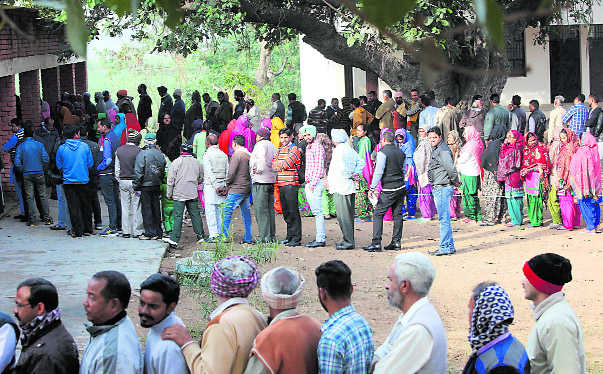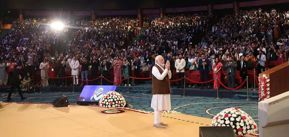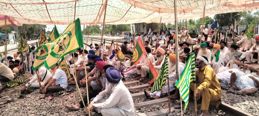
Changemakers?: Voters line up during the recent Assembly elections in Punjab
Ronki Ram
Punjab has never imagined the "political" without the ideal of some religion. It was for this reason that the "political" remained eclipsed under a paradigm apparently religious/sacred but inherently engaged with politics. It always reacted fiercely and sporadically while responding to the "political". But at the crucial hour, invariably, the response of the civil society remained indifferent. Babbar Akalis, Naxalites, and the Sikh radicals failed to exhort the people in Punjab when the state was haunting them. An ordinary Punjabi found it difficult to build a link between their struggle and the promised alternative politics. If at all, some turned sympathetic to their kind of politics, it was more in opposition to the corresponding regimes in power rather than the attraction of an alternative poltical discourse. Such political processes often create a lot of excitement in the beginning but failed to deliver in the end.
Consequently, the failure of the emergence of an alternative political regime often adds more strength to oppressive regimes throughout the chequered history of Punjab. After the failure of the movement of the Babbar Akalis, the colonial state became not only more repressive but was shrewd enough to manipulate the locale of the "political"' at the grassroots. The same can safely be applied to the rout of the Naxalite movement in Punjab in the 1970s that added to the ferocity of the brute power of the then poltical regime manifold. The movement of the Sikh radicals too followed the suit. Though the texture of the Naxalites movement in Punjab was non-religious, it too failed to generate any unified response among the peoples divided along religious lines. They probably understood the Left movement more as an alternative to “religion” than to mainstream politics. How come a society deeply soaked in religious colours can chisel a purely political alternative?
That is what currently happening to AAP in Punjab. It appears more or less as a motley of yesterday's lost and fragmented radical groups that once aimed at building an alternative poltical regime/discourse and are now simply promising to teach a lesson or two to those who ruined the state. The predominant election planks that the mandarins of AAP chose was the blasphemy and family business of Badals. It promised to clean the muck within no time once voted to power. Throwing the culprits into jails was yet another catchy slogan during the poll campaign. What exactly AAP would like to do constructively one has yet to figure out! However, the silent question that did the rounds during the elections was what the Communists failed to do when they were viable, would they manage to produce in their avatar in the AAP? The promises of the AAP could have been any thing but not a concrete model of alternative “politics”. How the electorate of Punjab would respond to it can be seen on March 11. What difference one expects from a change, if there would be any, in the real sense of the term, is no body's guess at present.
Nevertheless, what makes this Assembly Election the most interesting is not the possibility of the emergence of an alternative politics but the defeat of the existing coalition. And still what has never been debated before and during the campaign was the bold claim of the current government in providing social security and better infrastructure in the state. What led the people to throng the rallies of the AAP and the INC despite the liberal doling-out policy of the coalition government needs a more critical look. Is it the disjunction between infrastructural development and good governance or the jugglery of the star speakers of the AAP that pulled in big crowds during the recently concluded election campaign in a large number of constituencies across the three sub-regions of Punjab?
The Punjab elections have raised many more relevant questions in addition to the stereotype of good governance versus development. Is good governance possible without/alongwith development? What policy options are available to the political establishments to synchronise development with good governance? Or do we need a new interpretation of development in the post-consensus arena of political contestation? These are some of the most vexed questions that Socratesian logic demands to be debated at the portal of electoral democracy. The eagerly awaited verdict may provide a few answers to some of them.
The writer is ICCR Chair Visiting Professor of India Studies, Faculty of International Studies, Ryukoku University, Kyoto, Japan



























